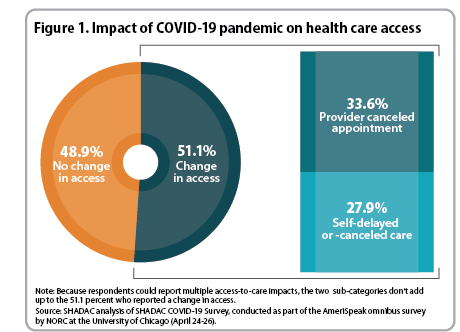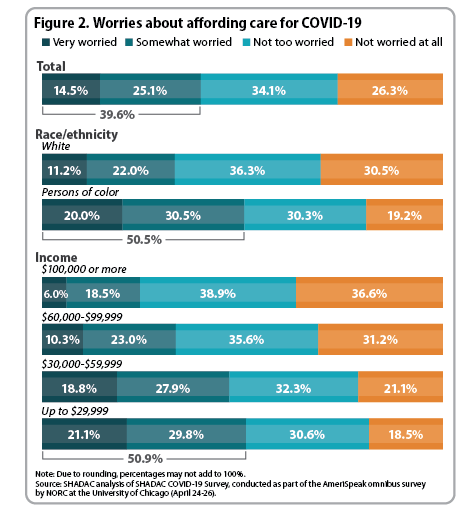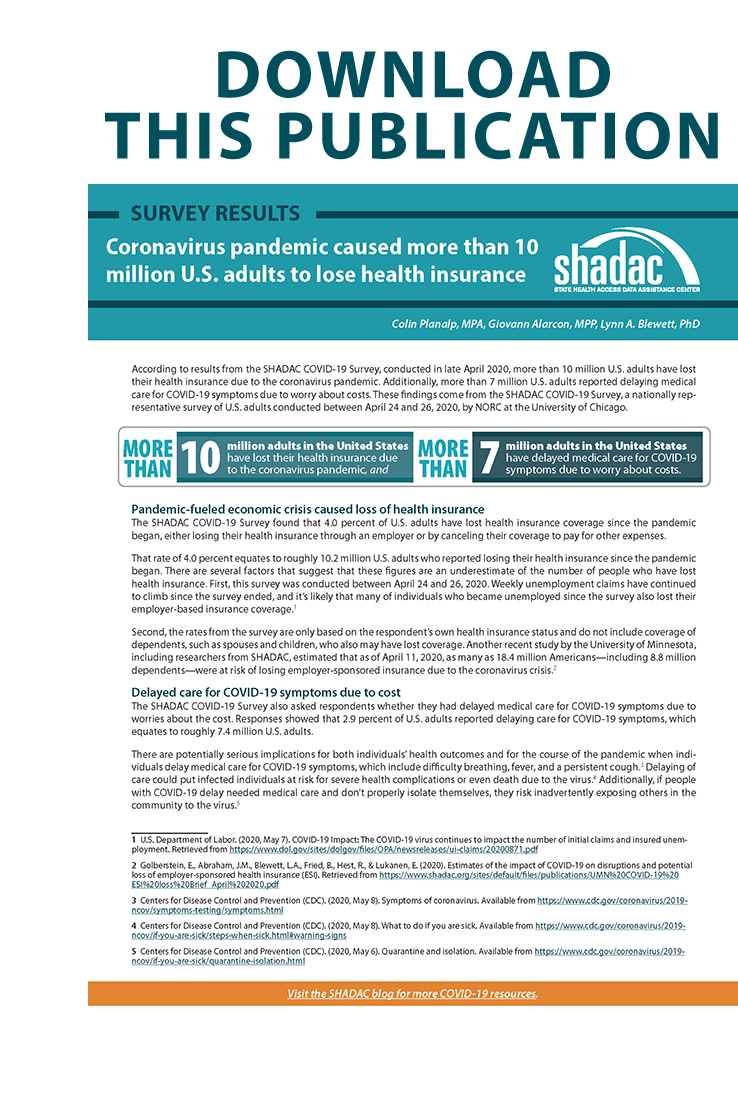Blog & News
Coronavirus pandemic caused more than 10 million U.S. adults to lose health insurance
May 14, 2020:Colin Planalp, MPA, Giovann Alarcon, MPP, Lynn A. Blewett, PhD

According to results from the SHADAC COVID-19 Survey, conducted in late April 2020, more than 10 million U.S. adults have lost their health insurance due to the coronavirus pandemic. Additionally, more than 7 million U.S. adults reported delaying medical care for COVID-19 symptoms due to worry about costs. These findings come from the SHADAC COVID-19 Survey, a nationally representative survey of U.S. adults conducted between April 24 and 26, 2020, by NORC at the University of Chicago.
Pandemic-fueled economic crisis caused loss of health insurance
The SHADAC COVID-19 Survey found that 4.0 percent of U.S. adults have lost health insurance coverage since the pandemic began, either losing their health insurance through an employer or by canceling their coverage to pay for other expenses.
That rate of 4.0 percent equates to roughly 10.2 million U.S. adults who reported losing their health insurance since the pandemic began. There are several factors that suggest that these figures are an underestimate of the number of people who have lost health insurance. First, this survey was conducted between April 24 and 26, 2020. Weekly unemployment claims have continued to climb since the survey ended, and it’s likely that many of individuals who became unemployed since the survey also lost their employer-based insurance coverage.1
Second, the rates from the survey are only based on the respondent’s own health insurance status and do not include coverage of dependents, such as spouses and children, who also may have lost coverage. Another recent study by the University of Minnesota, including researchers from SHADAC, estimated that as of April 11, 2020, as many as 18.4 million Americans—including 8.8 million dependents—were at risk of losing employer-sponsored insurance due to the coronavirus crisis.2
Delayed care for COVID-19 symptoms due to cost
The SHADAC COVID-19 Survey also asked respondents whether they had delayed medical care for COVID-19 symptoms due to worries about the cost. Responses showed that 2.9 percent of U.S. adults reported delaying care for COVID-19 symptoms, which equates to roughly 7.4 million U.S. adults.
There are potentially serious implications for both individuals’ health outcomes and for the course of the pandemic when individuals delay medical care for COVID-19 symptoms, which include difficulty breathing, fever, and a persistent cough.3 Delaying of care could put infected individuals at risk for severe health complications or even death due to the virus.4 Additionally, if people with COVID-19 delay needed medical care and don’t properly isolate themselves, they risk inadvertently exposing others in the community to the virus.5
Pandemic created barriers to health care access
Since the pandemic began, many people have gone without or delayed care for conditions unrelated to COVID-19, including preventive care such as cancer screenings; treatment of chronic conditions; and medical emergencies, such as heart attacks and strokes. In some cases, health care providers have proactively canceled appointments for conditions other than COVID-19 in preparation for anticipated surges of patients suffering from the coronavirus, as well as to protect patients from unnecessary exposure to the virus. In additional instances, individuals have canceled or delayed care due to their own concerns around exposure to the virus.

The SHADAC COVID-19 Survey also asked whether respondents had experienced delayed or canceled health care appointments due to the pandemic. Half of U.S. adults (51.1 percent) said they had delayed or canceled health care appointments due to the coronavirus crisis (Figure 1). Approximately one-third (33.6 percent) said they had an appointment canceled by their health care provider due to the pandemic, and more than one-quarter (27.9 percent) said they had made the decision to delay or cancel an appointment to avoid potential exposure to the virus.
Worries about affordability of care for COVID-19
 The survey also asked respondents how worried they were about being able to afford health care if they contracted COVID-19. Responses showed that 39.6 percent of U.S. adults were “very worried” or “somewhat worried” about their ability to afford health care if they were to contract the coronavirus (Figure 2). However, that rate varied across different segments of the population.
The survey also asked respondents how worried they were about being able to afford health care if they contracted COVID-19. Responses showed that 39.6 percent of U.S. adults were “very worried” or “somewhat worried” about their ability to afford health care if they were to contract the coronavirus (Figure 2). However, that rate varied across different segments of the population.
Approximately half (50.9 percent) of U.S. adults with incomes below $30,000 reported being “very” or “somewhat worried” about their ability to afford care should they contract COVID-19, and about half (50.5 percent) of persons of color (e.g., American Indian, Asian and Pacific Islander, Black, and Hispanic) also reported being “very” or “somewhat worried.” Both of these rates were significantly higher than the overall rate of 39.6 percent. Worries about the ability to afford treatment for COVID-19 raise particular concerns during the coronavirus pandemic because they could lead people to delay needed care, potentially resulting in both dire health consequences for individuals and increased community spread of the virus.
More on the survey
The SHADAC COVID-19 Survey on the impacts of the coronavirus pandemic on health care access and insurance coverage was conducted as part of the AmeriSpeak omnibus survey conducted by NORC at the University of Chicago. The survey was conducted using a mix of phone and online modes from April 24 and 26, 2020, among a nationally representative sample of 1,007 respondents age 18 and older.
Acknowledgment: We appreciate contributions to the survey by Sarah Gollust of the University of Minnesota School of Public Health and Brendan Saloner of the Johns Hopkins University Bloomberg School of Public Health.
1 U.S. Department of Labor. (2020, May 7). COVID-19 Impact: The COVID-19 virus continues to impact the number of initial claims and insured unemployment. Retrieved from https://www.dol.gov/sites/dolgov/files/OPA/newsreleases/ui-claims/20200871.pdf
2 Golberstein, E., Abraham, J.M., Blewett, L.A., Fried, B., Hest, R., & Lukanen, E. (2020). Estimates of the impact of COVID-19 on disruptions and potential loss of employer-sponsored health insurance (ESI). Retrieved from https://www.shadac.org/sites/default/files/publications/UMN%20COVID-19%20ESI%20loss%20Brief_April%202020.pdf
3 Centers for Disease Control and Prevention (CDC). (2020, May 8). Symptoms of coronavirus. Available from https://www.cdc.gov/coronavirus/2019-ncov/symptoms-testing/symptoms.html
4 Centers for Disease Control and Prevention (CDC). (2020, May 8). What to do if you are sick. Available from https://www.cdc.gov/coronavirus/2019-ncov/if-you-are-sick/steps-when-sick.html#warning-signs
5 Centers for Disease Control and Prevention (CDC). (2020, May 6). Quarantine and isolation. Available from https://www.cdc.gov/coronavirus/2019-ncov/if-you-are-sick/quarantine-isolation.html










